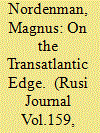| Srl | Item |
| 1 |
ID:
075662


|
|
|
| 2 |
ID:
132095


|
|
|
|
|
| Publication |
2014.
|
| Summary/Abstract |
Since the 1990s, Denmark, Norway, Sweden and Finland have worked as NATO members or partners, participating in expeditionary operations and playing political leadership roles in the transatlantic security community. Today, however, the Nordic-Baltic security environment is changing rapidly, a trend only further accelerated by the Ukraine crisis. Magnus Nordenman argues that the emerging strategic environment will force the Nordic nations to focus on challenges closer to home, and that their current defence constructs will be challenged if they are not further refined and if co-operation is not extended
|
|
|
|
|
|
|
|
|
|
|
|
|
|
|
|
| 3 |
ID:
123886


|
|
|
|
|
| Publication |
2013.
|
| Summary/Abstract |
During the Cold War, Nordic cooperation blossomed and the region's identity was strong, yet defence was left outside the Nordic framework. After the end of the Cold War, Nordic cooperation waned and it was largely replaced by cooperation within the framework of the European Union. During the past couple of years, however, Nordic defence cooperation has been boosted by a number of initiatives and common projects.
This article analyses this recent rise of Nordic defence cooperation. In terms of theory, it revolves around the question of how material and identity factors explain security cooperation in today's Europe.
During the Cold War, identity was an easy explanation for societal cooperation between the Nordic countries, but geostrategic factors and national interests based on them determined (the lack of) defence cooperation. Even today, Nordic defence cooperation is justified more by cost-efficiency and geographical proximity than by common identity.
This article argues that Nordic identity nevertheless plays an important role in motivating defence cooperation. It is not driven by pure cost-efficiency or strategic calculation. The role of identity needs to be understood, however, not as a kind of independent force but as part of the political process.
Nordic identity explains the rise of the region's defence cooperation in two ways: it facilitates informal cooperation between defence officials at various levels, and it is easy to sell international defence cooperation politically to domestic audiences if it is done in the Nordic context. Yet Nordic cooperation is not seen as contradicting European or NATO cooperation.
|
|
|
|
|
|
|
|
|
|
|
|
|
|
|
|
| 4 |
ID:
075663


|
|
|
|
|
| Publication |
2006.
|
| Summary/Abstract |
Which countries learn from which other countries in the course of cooperation in the Nordic and European open method of coordination (OMC) committees? That is the key question this article addresses.The goal is to contribute to the body of research on Europeanization by exploring its 'horizontal' thrust. The object of the study is the direction of learning as perceived by participants in European OMC committees and Nordic committees with similar functions. The approach implies cross-testing of two key hypotheses: (1) the direction of learning in international committees is dependent on which countries can show 'best practice', and (2) learning in international committees is dependent on the degree to which countries share a similar economic-political background (the 'most similar' hypothesis). The cross test affirms the 'best practice' hypothesis, whereas the 'most similar' hypothesis is shown to be significant only to the extent that
|
|
|
|
|
|
|
|
|
|
|
|
|
|
|
|